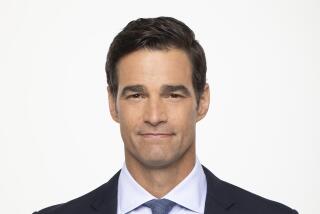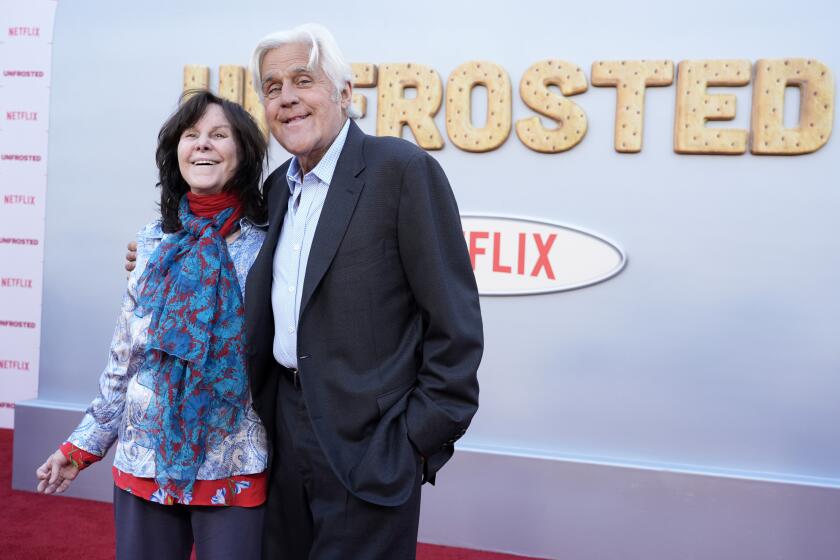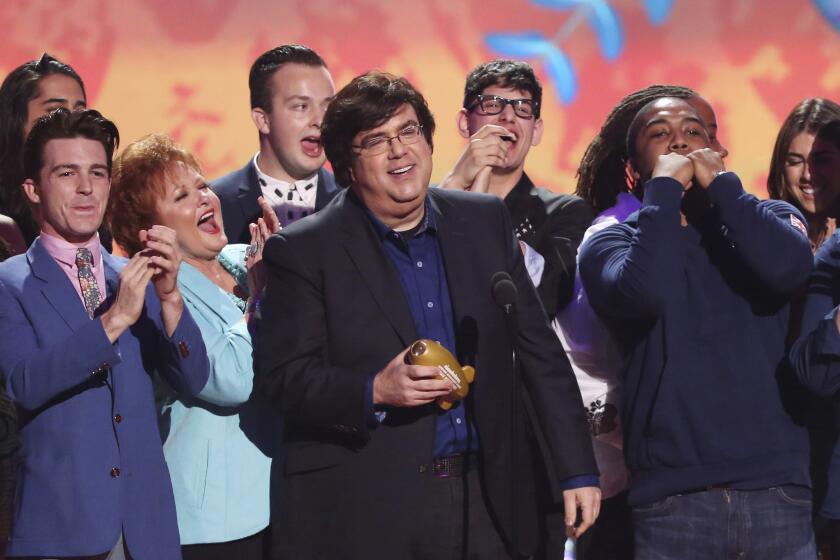TV in Your Pocket Is the Next Small Thing
It used to be that watching TV meant just that: aiming your eyeballs at a television set.
On Monday came proof of just how outdated that definition has become.
First, Apple Computer Inc. announced that it had sold 1 million video downloads in the 19 days since it unveiled its video iPod. Among the top sellers were $1.99 episodes of ABC’s hits “Lost” and “Desperate Housewives,” which can be seen on iPods or computers.
Then, NBC confirmed that beginning today, it would make video excerpts of “The Tonight Show With Jay Leno” available for download by Sprint mobile telephone customers. The network is betting that, in exchange for the convenience of watching Leno’s monologue anytime, fans will pay for something they already get for free.
“Apple’s success certainly reinforces the view that there is a demand out there,” said Bob Wright, chairman of NBC Universal. “How big? It’s too soon to say. But it’s for real, and it’s going to be with us for a long time.”
Welcome to the age of fast-food TV: nuggets of news and entertainment that can be consumed on cellphones, video game consoles and digital music players. Whether the programming is downloaded via iTunes software or over a cellular network, the trend is changing where -- and how -- TV watchers are tuning in.
“The notion of a particular screen being tied to a particular kind of content is breaking down,” said Van Baker, an analyst with Gartner Inc. “It’s what kind of screen is available to me right now, and that’s what I’ll use.”
For Hollywood, cellphones with color screens and the ability to download video files couldn’t come at a better time. Executives are under pressure to find new revenue as the industry’s most powerful profit engines -- DVD sales, 30-second commercial spots and syndicated TV reruns -- lose steam.
Broadcast networks and cable channels, wary of losing advertising dollars to the Internet, have been experimenting for months to learn what works -- and what doesn’t -- on an itty-bitty screen.
“What are the three things that you always have with you? Your money, your keys and your cellphone,” said Lucy Hood, president of Fox Mobile Entertainment. “If we can deliver a fun entertainment experience on this device, that will make it a very powerful medium.”
But figuring out what can be successfully adapted and sold on a hand-held device has been a process of hit and miss.
A clear winner in the small format is comedy. Among the most popular offerings on Verizon Wireless’ V Cast video service, for example, are clips of Jon Stewart’s fake news headlines on Comedy Central’s “The Daily Show.” V Cast subscribers, who pay $15 a month, also can see bits from ABC’s “Jimmy Kimmel Live” and even “Sesame Street.”
Leno is the first big-name comedian to be featured on Sprint TV Live, a $9.99-a-month video service that the cellular provider launched in September. As part of the package, subscribers can watch live feeds from the Weather Channel, MSNBC, Discovery and Fox News Channel.
News and sports highlights also have lured consumers. Several cellular phone carriers have contracted with NBC, CNN and ESPN, among others, to provide snippets of the day’s news.
To be sure, most U.S. consumers have yet to try such offerings. Only about 11% of cellphone owners use wireless data services, according to Forrester Research. Of the $111 billion spent on mobile services last year, research firm Yankee Group estimated that only 5% was for data, mostly text messaging.
“Consumers still, by and large, think of their cellphones as something for communication rather than for entertainment,” said Charles S. Golvin, principal analyst with Forrester Research.
But Nancy Tellem, president of CBS Paramount Network Television Entertainment Group, has no doubt that cellphone TV will catch on.
“All I have to do is look at my kids and see how they watch television,” said Tellem, noting that they’re often text-messaging on their cellphones as they watch TV.
Still, some TV studios have been hesitant to overload their directors and actors, who are already working on tight production schedules.
“The question is: Is this a business?” said Mark Pedowitz, president of Walt Disney Co.’s Touchstone Television. “I don’t have an answer to that yet.”
Some studios are taking a more cautious approach: making existing or repackaged entertainment content available on cellphones merely as a promotion. Universal Pictures, for example, put its trailer for its upcoming film “King Kong” on Sprint TV.
Beginning this week, Verizon V Cast subscribers also will have access to recaps of several Warner Bros. shows, including “Smallville,” “Gilmore Girls” and “Nip/Tuck.” ABC also condenses some of its hit shows.
Hollywood labor leaders, however, are crying foul. Collective bargaining agreements do not require studios to pay residuals when they use clips and outtakes for promotion. But Patric Verrone, president of the Writers Guild of America, West, asks whether it is possible to “promote” an episode that has already aired.
“It’s promotion all right. It’s promoting these companies’ ability to make a profit,” he said.
Meanwhile, TV stations affiliated with the major networks also are worried about the effect of cellphones and digital video players. Specifically, they fear an erosion of their ability to charge premium rates for commercial time during popular programs.
Some executives say fears that shows lose their value when they are distributed on other platforms are overblown.
“People aren’t watching the entire show, they’re seeing a clip,” said Greg Clayman, vice president of wireless strategy and operations at MTV Networks, which repackages “The Daily Show” headlines, among other things, for cellphones. “We believe this will drive tune-in to the actual show.”
When it comes to creating original content for cellphones, however, the road to success has been paved with instructive failures.
Last year, Fox began creating one-minute episodes, or “mobisodes,” for mobile phones. The studio produced more than 100 such shows, including a scripted drama about a trendy Sunset Strip hotel.
When Fox tried to spin off the hit show “24” in Britain, however, it faltered. “24: Conspiracy” had the same seduction, betrayal and murder that fans of the hourlong drama have come to expect. But the 24 one-minute episodes, which cost 6 pounds (or about $10.50) to download, lacked one thing: the star, Kiefer Sutherland. A-list actors like him, Hood said, were beyond the budgets of such a small-margin enterprise.
“There was a lot of excitement about the boldness of creating original content for cellphones,” Hood said, explaining why Fox ultimately killed the spinoff. “Frankly, people wanted to see Kiefer.”
At NBC, the decision to put the reigning king of late night on a 1 1/2 -inch screen didn’t faze Leno.
“This is just another way of getting the jokes out there,” he said Monday, predicting that their arrival on cellphones would have what he called “a wonderful effect” on the car insurance industry: “People driving off the road.”
*
Times staff writer Terril Yue Jones contributed to this report.
More to Read
The biggest entertainment stories
Get our big stories about Hollywood, film, television, music, arts, culture and more right in your inbox as soon as they publish.
You may occasionally receive promotional content from the Los Angeles Times.







